The Challenges of ACL Rehab- It’s Never Easy!
It seems like I always have someone on my schedule that is post-op ACL reconstruction (or anything post-op, for that matter!). Although I thoroughly enjoy progressing ACL rehab because this population is very motivated to get back to their sport or activity.
Knowing that it scares the bejeezus out of me at times!
There are so many variables, almost too numerous to count, that can affect the outcomes. Some are modifiable and some are not. I wanted to take a moment and step back from the boring “just need to get knee hyperextension posts” that I’ve done in the past and take a more holistic approach.
The Little Details
For those that know me, this may be a bit of a stretch. But I honestly think that the little details of the process are just as important as the big picture. It’s like anything else, you need to focus on the little details in order for the final goal to be achieved. The same is true for ACL rehab but I feel like this is something that is missed by many and can make or break a good outcome (which we know can be hard to find).
There’s a reason why nearly 25% of ACL reconstruction patients have a retear event and need a revision surgery. I’m not saying this is the only reason but I will say the mental aspect of the process can help the athlete during he process, and that begins post-op day 1 when they present to me in the clinic!
So, what’s going through my mind when I’m rehabbing someone after an ACL reconstruction?
Human Soul, Mind, Spirit
From the get go, I’m trying to figure out the psyche of the person in front of me. Look up the word psyche in the dictionary and it means ‘human soul, mind or spirit’. This exactly sums up what I’m trying to define early on.
The tricky part is connecting with this person (and their family) so they can gain the utmost trust in you. You see, their future is in your hands so there’s a lot of blind trust that is going on early in the rehab process. They’re in pain, clueless to the process and hoping you know what the heck you’re doing.
I know the basic principles of ACL rehabilitation- calm the knee down, get their ROM back and get them walking/running/jumping. There’s a lot more to do but I’m being wicked brief, I know. And it does go way beyond that, trust me! It’s much easier said than done for most.
Some Factors to Consider
Each case involves a gazillion variable to consider when I’m trying to outline a logical rehab program. Often it can consist of:
- pre-op status
- graft choice
- meniscal involvement
- other joint issues (bone bruise)
- revision surgery
- surgeon
- pain status
- previous surgery (if so, how did that go?)
- ultimate goal
- school status
- home situation
- good support
- insurance (not as much for me due to OON)
It goes on and on, trust me! If you don’t believe me, then read this paper that I found AFTER writing this blog post. Basically sums up my nearly 15 years of experiences very well. Check it out, if you want… Psychological predictors of anterior cruciate ligament reconstruction outcomes: a systematic review.
So my mind races as I’m trying to figure this stuff out. I’m also trying to sound half educated as I progress their program and observe their response to each new exercise, cue and bad joke I make.
Some people freak out with anyone touching their knee cap while others just sit there and chat it up. If I see the freaked out person begin to squirm, I need to anticipate that the next few steps may equally be a challenge for the client. Knowing that (and assuming that), I go into show mode and make every attempt to turn the focus from their knee and each and every painful bend or leg raise, to something very obscure. To me, it’s all about mind games.
Mind Games
Wait, I’m playing mind games with my clients? You better believe it. This is basically how I test my clients’ response to me, my personality, my rehab style and how the next 6-9 months will go. If I see a stoic, scared response, then I need to step up my game and find a common connection, QUICKLY!
The rehab especially at the beginning, is not about their flexion ROM or their swelling control but it’s about them gaining trust in me as their PT. Do they want to come to PT and put their complete future in my hands? Do they trust that I know what I’m doing and can lead them to their eventual goals? I hope so and it starts from that 1st joke I make or that 1st outcome study that I have to quote.
I don’t know which one will win them over but I have to be ready to offer either (or both). The last thing I need to happen is to have them show up for the next session and completely lose faith. If for some reason their swelling is up or their pain is worse (which happens in nearly 100% of the cases that I see) then I need to be able to talk them off the ledge and let them understand that it’s completely normal.
N=1 mindset
They have no comparisons to make. They also think their experience is worse than all others and that no one else has had swelling 2 weeks out of surgery. Or that all people can walk without crutches 7 days out of surgery, but they still have their crutches 14 days out. They have an n=1 mind and have no other experiences to compare it to but I have a database of cases to rummage through in my head.
Hope my mind can come up with a similar situation, make it real for them and get them back to reality…and get their faith back!
Trust me, no surgery is a guaranteed success and we know ACL surgery is a long ways a way from being perfect but we can truly make a difference by our confidence and personality.
I’ve made a career of this and can’t stress it enough!
Like the post? We have more to offer…
I hit upon all of this a little bit more in my online knee course that I have with Mike Reinold. If you’re interested in learning more about how we treat the knee, then go to our all online knee course that covers all topics including post-op ACL, TKA, PF surgeries. Also non-op treatment of the knee and a great overview of treatment progressions. The discussion boards are a great way to interact with other professionals and chat about the course and your own personal cases/experiences. Check it out soon!

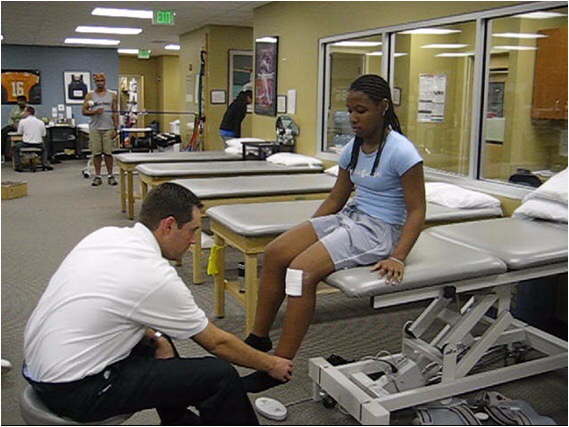

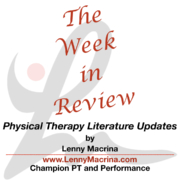
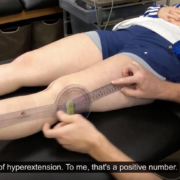
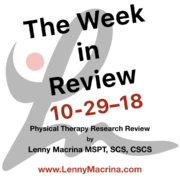
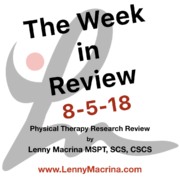
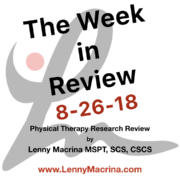


Great posts, Lenny, excited to read more– always enjoy your insight.
Thanks HJ…much appreciated!
L-Mac, I love this post and the rest. I appreciate your candidness, simplicity, and humor. As a PTA it’s refreshing to hear a PT speak honestly and openly about difficult things. Versus the “I’m a PT and know more than you”. Thanks again and keep it up.
Lenny! This post (and all the others) is awesome. Perfect timing for a specific patient I’m currently seeing pre-op ACL who is terrified of using her leg at all. Thanks for the insight. Happy Holidays.
Thanks Abby, yeah as much as we think ACL patients can do very well it’s a physical and mental battle for many months.
The best and most honest post I’ve read in a while. Psyche can be so much more important than the objective measures we’re sometimes obsessed with. And now I know I’m not the only one who tries to make a connection quickly, even if that means a bad joke.
thanks Mallory. Much appreciated!